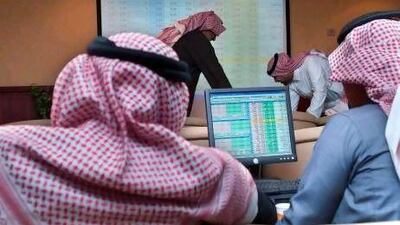The Saudi financial market is rather like the Tadawul Tower, the Riyadh building that will eventually house the country's stock market: potentially awesome but still under construction.
International investors have been eagerly anticipating "getting into" Saudi Arabia for years. The energy-fuelled economy is the biggest in the Arabian Gulf; it has the largest population in the GCC region with, potentially, a huge domestic consumer market.
The Tadawul All-Share Index is the region's biggest by market capitalisation and the financial and banking infrastructure, buoyed by historically high oil prices, is sturdy by even the most stringent of international benchmarks.
The market is the most liquid in the Gulf region and the companies listed on it represent a real cross-section of the economy, unlike the financial and property-dominated markets of other GCC countries.
Yet direct foreign investment is only a small proportion of the US$400 billion (Dh1.46 trillion) market for Saudi equities and is confined to fellow GCC members. The outside world is still forbidden from direct equity holdings on the Tadawul.
Progress has been slow since the last move towards opening up the Tadawul in 2008, when foreigners were allowed access via "total return swaps" arrangements with local firms. However, many institutional investors remain wary of these instruments.
At the beginning of this year, there was speculation the Saudi authorities were about to allow direct foreign investment but, so far, there has been no action.
A new wave of optimism swept over potential foreign investors a couple of months back when the country enacted its first ever mortgage law, which was interpreted as a sign radical change was also on the way in equities.
"We've been hearing for so long that the market was on the verge of opening up but things move very slowly here, especially regarding non-Arabs," says one western investor based in Riyadh, who declined to be identified. "It's a cautious, step-by-step approach in a very conservative country."
Al Rahji, one of the kingdom's biggest banks, gave a hint as to the reason in a recent research paper: "The entry of foreign investors in the stock market is believed to cause higher volatility due to the flow of hot money and can potentially create an issue of liquidity management for the central bank."
Suspicion of foreign investors and a reluctance to be perceived as handing over Saudi assets remain powerful forces.
Jamal Al Kishi, the chief executive of Deutsche Securities Saudi, part of Deutsche Bank, says movement towards internationalisation of Saudi markets may have slowed but that does not mean it will remain a "closed" market forever.
"It has slowed because of the global financial situation and a natural desire to be cautious but it is an exaggeration to say it is closed," he adds.
"Banking, for example, is far more open to international entrants." On equities, the conventional view of a closed, inert market is also inaccurate, says Mr Al Kishi. "The reality is that the Saudi market is being looked at unfairly. It is not more closed or less transparent than other GCC or emerging markets [EMs]. It is maybe less open than the West but is on a par with other GCC and EM exchanges."
Certainly in regional terms, Saudi equity markets have been the mainstay of activity since the collapse of Lehman Brothers in 2008.
"The subdued IPO performance in the GCC during the past couple of years has coincided with the growing dominance of Saudi Arabia among the regional equity markets," says Jarmo Kotilaine, the chief economist of National Commercial Bank, another of the Saudi banking giants. "Even though Saudi issuance is sharply down on the pre-crisis levels, the kingdom is the only country to have seen consistent issuance activity.
"In aggregate terms, Saudi companies have accounted for some 57 per cent of the total value $5.6bn of IPOs since 2009," Mr Kotilaine says.
"At the same time, Saudi has also seen a number of public follow-up offerings with existing listed companies returning to the primary market to raise additional funds. By contrast the UAE, which used to be the second-largest regional IPO market, had issues worth only $271.3 million, some 5 per cent of the total."
Mr Kotilaine believes there are several reasons for the comparative vigour in Saudi markets: the size and liquidity of the Tadawul; a healthy regulatory environment in which the authorities actively support IPOs; and the diversity of sectors listed on the markets.
Nonetheless, there have been impediments to its organic development. A 2006 collapse in the Tadawul, which wiped more than half the value off the index, deterred many smaller investors from returning to the market.
International investors have also been deterred from investing in Saudi-linked indexes following a spat between the Tadawul authorities and MSCI Barra, the organisation that compiles them. Saudi Arabia still does not figure in the MSCI emerging or frontier markets indexes, while the UAE and Qatar each have frontier status.

